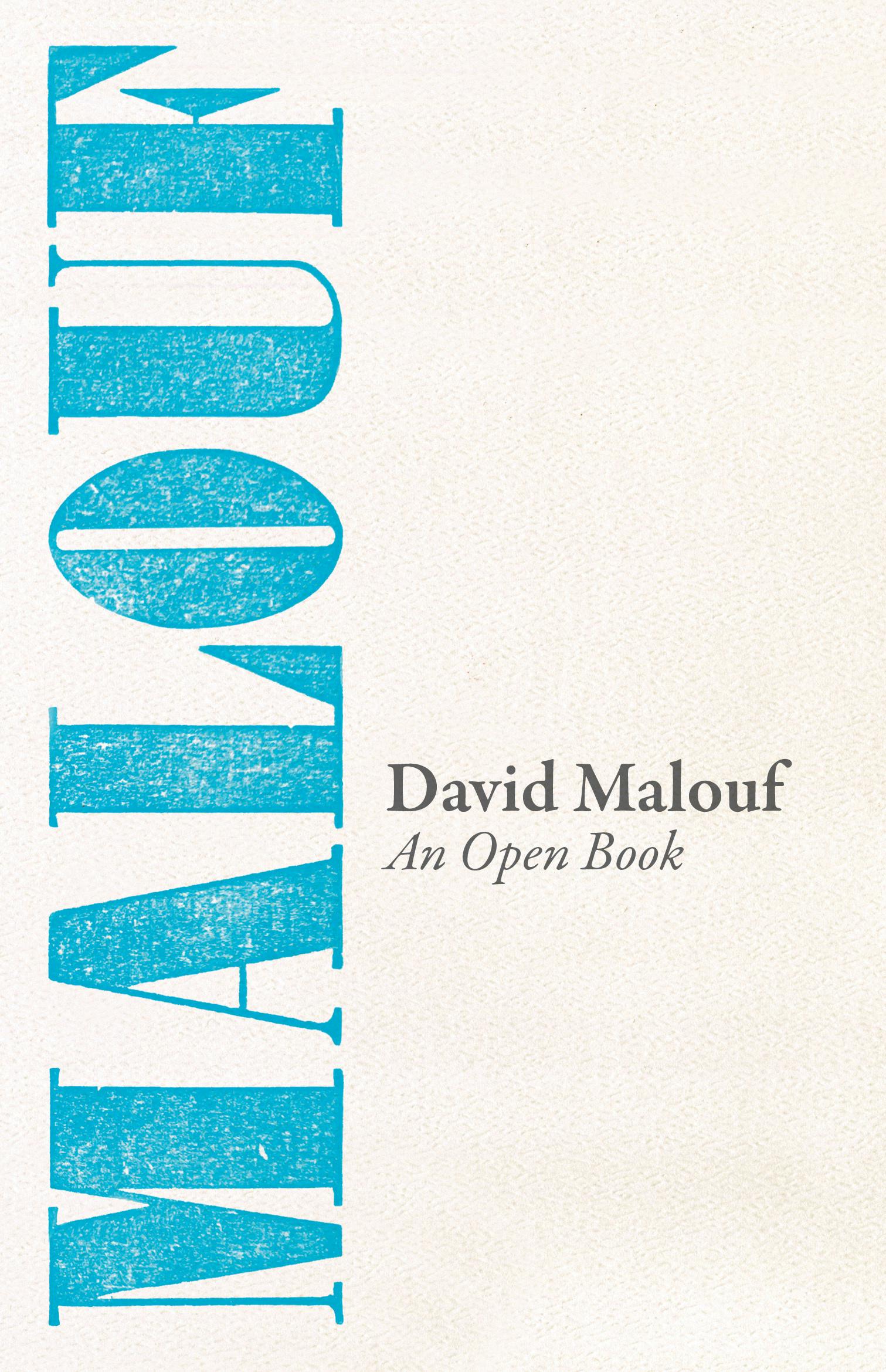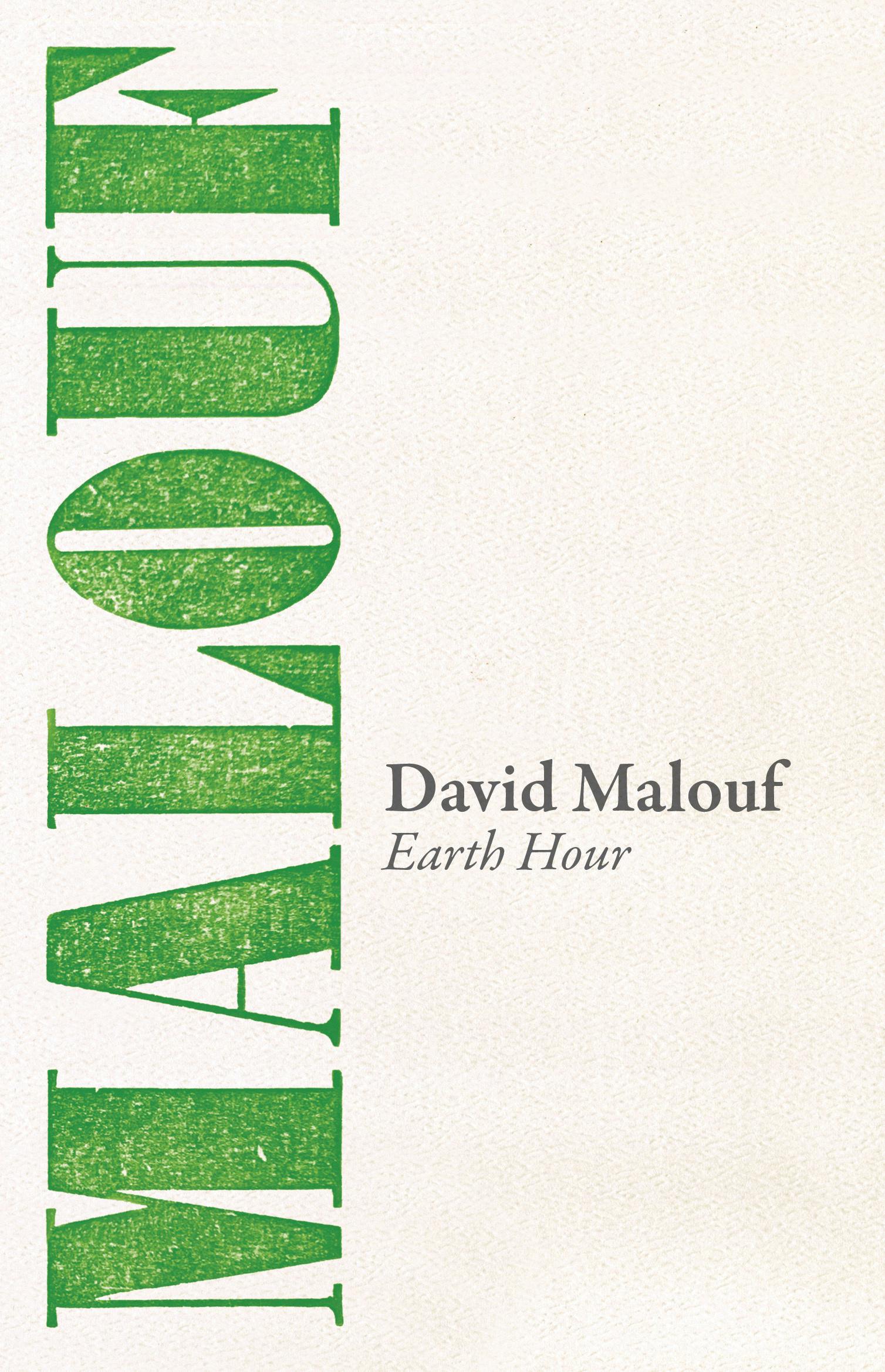



Sky News and Compost: David Malouf's An Open Book
Georgina Woods on David Malouf
In David Malouf’s latest two volumes of poetry, Earth Hour (2014) and An Open Book (2018) the dialogue between the world and the mind is an intimate and easeful – though mysterious – exchange, as clear and indefinite as the sky. The volumes are companions, in dialogue with each other and with people, culture and the natural world.'
The Tao master Zhuangzi proverbially dreamed he was a butterfly, flitting and feeling truly a butterfly as he went. Upon awakening, he was no longer able to discern whether he had been a man dreaming he was a butterfly, or was a butterfly now dreaming he was a man.
Sometimes a natural image invites ambiguity in mind and poem. As I walk under a flowering grey box, do small honeyeaters flitter from blossom to blossom like my thoughts, or are my thoughts as I watch them roving restlessly in search of sweetness like honeyeaters? Poets must make this choice between subject and object again and again. It is an exchange: the natural world helps us understand ourselves and we understand the natural world by examining ourselves.
In David Malouf’s latest two volumes of poetry, Earth Hour (2014) and An Open Book (2018) the dialogue between the world and the mind is an intimate and easeful – though mysterious – exchange, as clear and indefinite as the sky.
The volumes are companions, in dialogue with each other and with people, culture and the natural world. They share not just themes, images and forms but sequences and titles. Poems called ‘Garden poems’ ‘Still Life’ and ‘Windows’ appear in both titles. An Open Book adds a third to the two ‘Aquarius’ poems of Earth Hour. The first ‘Aquarius’ opens that volume and dives into subject’s mysterious relation to the world. It begins with a half-sentence as if continuing a conversation. The opening lines render sky and sea imagery that at once invokes and defies mortality and shrinks the subject-persona. These will become enduring motifs of the volume:
One of those sovereign days that might seem never
intended for the dark: the sea’s breath deepens
from oyster-shell to inky, blue upon blue,
heaped water, crowded sky. This is the day,
we tell ourselves, that will not end…
The poem is almost a sonnet — but has cracked and spilled onto fifteen lines and is split by a broken two line volta: ‘…till something in us/ snaps, a spring, a nerve. There is more to darkness/ than nightfall…’ In the second part of the poem, a mirror lens shows us a reversed reflection of ourselves:
… Caught reversed in a mirror’s lens,
we’re struck by the prospect of a counterworld
to so much stir, such colour; loved animal
forms, shy otherlings our bodies turn to
when we turn towards sleep; like us the backward
children of a green original anti
-Eden from which we’ve never been expelled.
The opening self-delusion of the day that will not end is repeated and complicated by the layered final lines. Earth itself is an anti-Eden, a defiantly miraculous challenger to the dream of supermundane paradise. We are its children, backward in our restless denial.
The name Eden recurs in both volumes, too, as does the trope of reversal. In the ‘Garden Poems’ of An Open Book, a garden’s microcosmic insect and arachnid drama is all ‘in a backward/ glance, to be read as/ the Eden we broke clear of, free// falling but on our feet.’ The poet imagines himself walking free of the mortal coil with a backward glance, evoking a departing glance of regret by the mythic first people of the Judeo-Christian tradition, as error brings down destruction and exile from a beloved home.
When I first read Earth Hour two years ago, it felt like walking out from under a ceiling into the open air. The collection created in me a sensation of profundity and spaciousness that I had been only half aware I craved. An Open Book gives further expression to that expansive sensation:
As a room that knows nothing
of sea-light or sea breezes fills like a sail
on the rumour of horizons. ‘The View from the Winter Palace’ (An Open Book)
The sky is a presence in both volumes. It is a medium, a source and an orientation. It is a foil for our near and precious ephemera. In ‘Kite,’ the persona holds a thread directly connecting him to this presence:
and I brace to meet
the tug, at thumb and heel, of another body, another will,
sky-god or eagle, (An Open Book)
As in the opening imagery of ‘Aquarius,’ the vast power of the sky does not diminish the subject but invites us to participate in its sweeping scale. The news brought in ‘Sky News’ (Earth Hour) is an insight as old, or older, than King Lear. We need a listening post to catch the signal and remember how unaccommodated we are. The sky’s darkness is a metonym for that memory:
We catch
at a remove what passes
between packed leaves and Heaven’sbreath as the big sky
story blows through
the gaps in conversations,caught without
shelter like Poor Tom
under the wet lick and whiplashof the metaphysical dark.
This poetry reminds us that we need not remain trapped in mirrors or in the shallows of vanity. The sky can lend grandeur to any modest domestic scene.
Malouf’s process of observation and understanding is undertaken in An Open Book partly through the persona of a child-Malouf, in the ‘Kinderszenen’ sequence, and partly in the voice of old-man-Malouf. The young persona of the ‘Kinderszenen’ poems discovers the world and his place in it piece by piece, image by image. It is an experience intensified by Malouf’s reflective and gnomic voice. In both volumes this voice is controlled through syntax, metre, rhyme and tense. He enjoys hyphenated adjectives that are redolent of ancient epics and the register of myth: ‘ghostly-insistent,’ ‘sky-bound,’ ‘earth-creature’ ‘earth-hum’ and ‘spittle-thread’ (for spider’s silk). More familiar compounds are split by his frequent enjambment as in ‘finger/tips,’ ‘space/ invaders,’ ‘home/-coming’ and ‘self//-containment,’ making line breaks carry considerable weight of meaning. The poems arrange aphorisms and infinitives among the imagery and action. ‘It’s the coin in use, the blade/ in action that mean business’ the persona tells us sagely, from Horace, in Earth Hour. In An Open Book, the first poem in the ‘A Knee Bent to Longevity’ sequence is subtitled ‘A word to the wise’ and begins with an inward exhortation:
To take things
in one’s stride. Not
to shuffle or totter. To beas a wheatfield, all ears
for the breezes that come
stalking and sighing, full
of birds’ cries and the whisper
of change.
The dimensions of this poem belie its weightiness. The sequence reflects on the wisdom and comedy of aging, an incongruous experience of expanding and diminishing. It evokes gratitude, wonder and peace-making, not in the voice of a teacher, but an old man reminding himself of his blessings and the things he’s learned about living a good life.
In form, Malouf’s poems are taut like the surface of a water drop, but thematically they are dense and complex as humus. Compost and soil are images to which he returns, and are apposite metaphors for how poetry processes memory, sensory imagery, allusion, music and language. In ‘Touching the Earth’ in Earth Hour’s ‘Garden Poems’ sequence we see ‘worms/ in their black café a pinchgut Versailles rabble// remaking the earth, processing tea-bags, vegetable scraps, and hot/ from the press news of the underworld…’ The poems mimic the nutrient cycle, ‘In the regular give and take/ the rhyme/ and rhythm of things’ (‘Small Wonders’ An Open Book).
Adaptations of Baudelaire, Horace, Dante and Heinrich Heine and allusions to Shakespeare, Donne and Mozart add to the tilth. Moments of politics, war and colonialism obtrude like tea bags among more organic shapes. These scraps retain their forms even as they are processed in the complex compost of the poet’s awareness and craft.
Written by an octogenarian, the composting process that awaits Malouf himself looms too, but death and decay can also unearth double meanings. In the ‘Garden Poems’ of An Open Book, the pairing ‘Leaves fallen, fallen leaves,’ continues the motif of death and mulch but uses an inverted phrase to do so, evoking cycles and reversal. The earth is both ‘Schatzkammer and midden, our green accommodating tomb’ (‘Earth Hour’ Earth Hour). It is ‘…a planet that is all/ abundance and consummate/ waste and replenishment’ (‘Seven Faces of the Die’ Earth Hour). Death and resurrection are alternating pairs, mirror images of each other. In ‘Sweet recurrence,’ (An Open Book) the arrival of a spring breeze brings the scent of green growth ‘out of the mould’ but it’s an old trick to lull the earth-bound into imagining that death is not final and a loved one can be restored. Death is not always recycling. Even for the earth itself, the rhythm of life can be disrupted. In the era of climate change, the world’s ‘interminable/ show of holy dying’ (‘Inner City’ Earth Hour) becomes a double entendre, conjuring not just the nutrient cycle that death drives, but the larger-scale pattern of planetary change we have precipitated in our wastefulness and hubris.
The poems of Earth Hour and An Open Book creep up on insight like an eager and cautious birdwatcher. To see a bird in the bush, you first need to become quiet and ‘get your eyes.’ If you spy a shadow in a tree ahead, you move closer to it, eyes fixed, trying to discern its colour, shape and qualities of movement. You want to get as close to the bird as you can without startling it away. I feel this attentive hunger reading these poems. The lure of birds lies in part in their sufficiency. They are complex, complete and endogenous. They are indifferent to us and so impose on the observer a humility and self-effacement that is deeply thrilling – ‘It is the small,/ the muted inconsequential,/ at this point that comes closest// to real’ (‘Before or After,’ An Open Book).
Birds speak in their own voices in Earth Hour and An Open Book, transcribed by the observing poet as in the Ground Thrush’s ‘sol-fa-sol-fa-doh’ in ‘An Aside on the Sublime’ (Earth Hour). A murmuration of starlings in Rome is recalled to invoke the chaotic and mysterious patterns through which a poem emerges on a page (‘A Recollection of Starlings: Rome ’84’ Earth Hour). The contrast between the sufficiency of birds and the aggrandisement that can so easily absorb us in the era of social media is wittily conveyed in ‘Aubade.com’ (An Open Book):
Trending this morning
on Twitter the same oldthe nothing’s new under
the noisy the nosey asthat holds
the mesh and mash of things
together
This, then, is a resolution of the poet’s version of Zhuangzi’s dream dilemma. The natural world cannot possibly be a metaphor for us. Its grand scale, age and complexity make a mockery of the old pathetic fallacy. If we want ‘an anchor against the sky’s/ unthreading’ (‘Pot hook’ An Open Book) we must invent it ourselves:
Nature will not provide.
It is too busy with its own
recoveries, its green
revisions against loss. (‘Pot-hook’ An Open Book)
It is we that must find nature in ourselves, and tend it, if we are to grow wisdom, succour or peace. It is we who must ‘be/ as a wheatfield, all ears’ and find the rhythms of loss, compost and recurrence even in this era of fitfulness and disruption